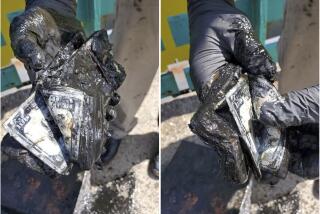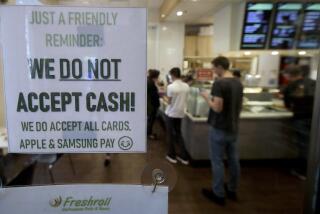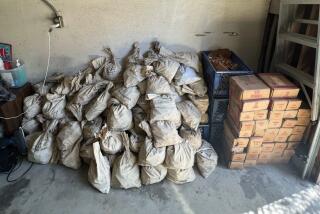A Penny Here, a Nickel There
- Share via
Christopher Hall, 33, has been saving small change all of his life. When he was 13, his mother gave him a coin-counting machine. Ever since then, whenever there was something big that he couldn’t quite afford, he’d cash in jars full of coins.
Years ago, the hair stylist used accumulated change to buy a car. He later cashed in $2,500 in coins to make a down payment on his house. Recently, he reached into his jars to help pay for a remodel of his Costa Mesa hair salon, Split Ends.
Hall gets more coins than the average guy because of his business. He’s also reluctant to spend them because he uses coins like some people use tax refunds.
Even though he realizes that it’s not necessarily brilliant to leave thousands of dollars lying around without earning interest, he considers collecting coins a painless way to save.
He’s not the only one throwing money into a jar. Millions of Americans empty their pockets each night into bowls, jars or sock drawers, said Alex Camara, senior vice president of Coinstar Inc., which operates change machines in 12,000 supermarkets nationwide.
The Bellevue, Wash.-based company, which took in about $2.1 billion in coins last year, estimated that Americans have $10 billion in coins accumulating in ashtrays and jars. The average household has $99 of change lying around, Camara added.
Hall can tell you that the only downside to saving coins is spending them. Waiters are not amused when you pay a check with a pile of dimes. And he figures that the car dealer who wouldn’t extend him credit regretted it mightily later, when he had to spend the night counting the backpack full of $11,000 in small bills and change that Hall used to buy his Toyota.
But if you want to convert those accumulated coins into something easier to spend, it can cost you either time or money, he said.
Over the years, his banks have either charged him “drive-off” fees or required that he write his name, address and account number on every roll of coins he deposited. Given that he typically waits until he has more than $1,000 before he converts his coins, the writing assignment could take hours, he said.
Once, he turned over his quarters to a laundromat, which didn’t charge a fee, but it still required hours of counting.
He has friends who take their coins to Las Vegas, where the casinos have trouble distinguishing change collectors from the average slot-machine gambler, and thus are willing to exchange coins without charging a fee.
Hall figures he would lose more to the lure of the slots than he would pay to a bank, so on his last change exchange, he dumped his coins into a Coinstar machine and accepted the company’s 8.9% fee.
“My total yesterday was $2,153,” he said. “It would take me three days to roll that.... I guess I could have my friends over for a pizza party to roll change, but that would cost me more too.”
On the bright side, turning coins into less-bulky cash is not as tough or as costly as it used to be, said American Bankers Assn. spokesman John Hall (no relation to Christopher Hall).
A dozen years ago, banks were taking change machines out of their branches or charging customers to use them because the machines were costly and the process required precious teller time, he said. But now they’re bringing the machines back as a marketing tool.
“There’s a movement to provide coin-counting machines as a selling point,” John Hall said. “The market has become very competitive.”
This year, Coinstar initiated a fee-free option for change collectors. About half of the company’s coin machines are equipped with gift certificate and gift card dispensers. Those who want credit at iTunes, Amazon.com, Starbucks, Borders, Hollywood Video, Eddie Bauer or Pier 1 Imports can get the full value of their coins, Camara said. In these instances, Coinstar collects its toll from the retailer, not the consumer.
“That’s become very popular, particularly with kids,” Camara said. “My kids use all their change now for iTunes.”
The catch for cost-conscious consumers is that it takes research to figure out where to turn in coins without paying a fee.
Although more banks are offering free change counting, it’s not universal, John Hall said. Interested consumers should call their local bank to find out whether their coins are welcome and what it takes to deposit them.
Only about half of Coinstar’s machines are equipped to provide the fee-free options, Camara said. To find one, consumers can check www.coinstar.com.
“Banks have really frowned on bringing in coins,” said Ken McEldowney, executive director of Consumer Action in San Francisco. “But I’ve heard of them having special days, when you could bring in all of your change, as long as you’ve rolled it.”
Still, he said: “It does give new meaning to being nickeled-and-dimed to death.”
Kathy M. Kristof welcomes your comments. Write to Personal Finance, Business Section, Los Angeles Times, 202 W. 1st St., Los Angeles, CA 90012, or e-mail kathy.kristof@latimes.com. For previous columns, visit latimes .com/kristof.
More to Read
Sign up for Essential California
The most important California stories and recommendations in your inbox every morning.
You may occasionally receive promotional content from the Los Angeles Times.













